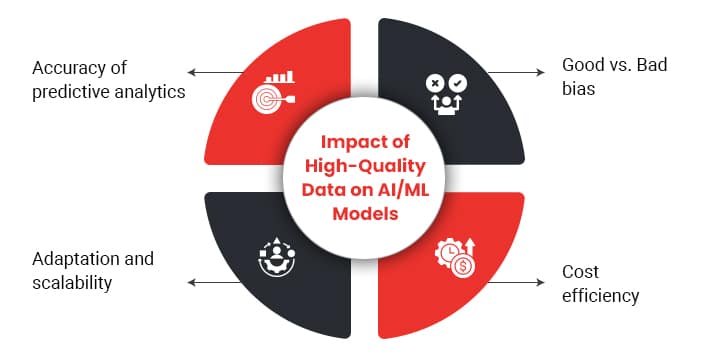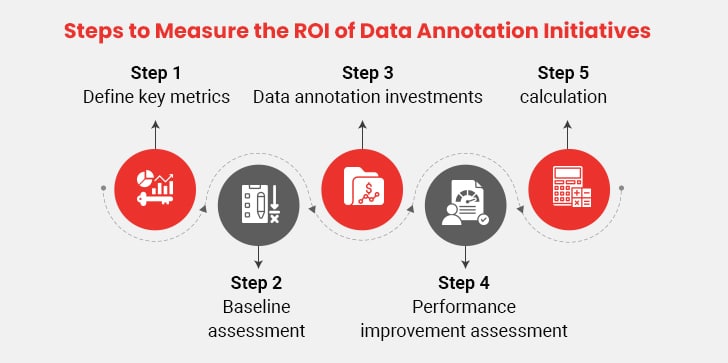In the domain of artificial intelligence (AI), the reliability of machine learning (ML) models is highly dependent on the accuracy and quality of the data being fed into them. And this is precisely where the data annotation process enters the frame, acting as the bedrock for training and developing AI systems. Data annotation services categorize and label the raw data, which provides necessary context and facilitates AI algorithms to learn and work accordingly.

Data labeling involves certain aspects that ensure the quality, reliability, and ethicality of the AI systems. These are:
- Accuracy: Let’s understand this through image annotation. The process involves addition of labels to every element of the image, such as ‘tree’, ‘car’, ‘road’, etc. These labels enable the AI model to understand patterns and recognize different objects. In the healthcare industry, accurately labeled medical images are necessary to develop reliable AI systems. An incorrectly labeled tumor, for instance, can be life altering for the patient. Or simply put, it can be the difference between life and death for an individual. To avoid such scenarios, the safe option is to invest in professional image annotation services.
- Diverse Datasets: With almost every application and business process becoming a data-spewing machine, data available is vast and varied. Training AI systems using these diverse datasets enhances their capabilities, enabling them to perform better in real-life scenarios. Think about sentiment analysis where data annotators tag text data and label different sentiments such as ‘neutral’, ‘positive’, or ‘negative.’ This requires an in-depth understanding of cultural contexts, language subtleties, and even irony or sarcasm on annotators part.
- Real-World Applications: For the real-world use cases, precision in annotation is utmost critical. Training data without precision is mere noise that yields unreliable results. And in the worst-case scenarios, the results are often devastating. For instance, in the autonomous vehicle industry, the accurate annotation of traffic signals, pedestrian crossings, service lanes, vehicles, and potential risks are vital for the AI system to navigate through the route safely. Otherwise, there can be lethal accidents, making it unsafe for everyone on the roads.
- Augmenting ROI: The adage “garbage in, garbage out” is true when developing AI/ML models. This implies that AI/ML models are as smart as the data fed into them. Thus, business with AI projects as their key focus must understand that the ROI sits precariously on the quality of annotated data. Better quality of annotated data results in more effective and reliable AI solutions, which further leads to higher business growth and greater customer satisfaction.
Boost ROI with High-Quality Data Annotation Services for AI Models
Understanding the Impact of Quality Data on Machine Learning Models
It is vital to note that data annotation isn’t just a method to prepare datasets for machine learning models. Instead, the process is an investment in the accuracy of the model, which will ultimately impact its market performance. Reliable and well annotated datasets ensure that algorithms learn accurate patterns and make the right predictions, which is essential for any business, especially startups where there’s little to no room for errors.

1. Accuracy of Predictive Analytics: The accuracy of the predictive analysis of any AI model depends on the quality of datasets it’s been trained on. For example, a firm designing an image recognition solution to detect defects in a manufacturing plant must leverage accurately annotated image datasets to train the model. Even a minute percentage of error in labeling images leads to incorrect identification of defective products, resulting in missed defects or recalls.
Or take another case of a healthcare firm leveraging a computer vision model to detect allergic reactions proactively. The model predicts an anaphylactic allergic reaction proactively and triggers alerts so that care givers take preventive measures quickly. Had this model been trained on inaccurate data, the results would be fatal.
2. Good vs. Bad Bias: Biases can be useful in situations such as optimizing storage based on merchandize size and weight. On the other hand, biases related to gender, ability, race, or religion can widen the already existing societal gap. When bad bias is fed into machine learning algorithms, the systems become unreliable and potentially harmful. Using high quality and diverse data also reduces bad bias in the ML models. This is especially useful when models are used for autonomous decision-making and facial recognition systems. A diversified dataset that represents the target demographics accurately mitigates the issue of model developing warped perspective. Think of a facial recognition system, which, if trained on images of individuals from only one demographic, may present incorrect results for other individuals. Balanced and diverse data annotation is required to create fair models.
3. Adaptation & Scalability: As business operations expand, the AI model should be able to adapt and scale to accommodate the new data. High quality data labeling service facilitates adaptability and scalability by ensuring that the data remains reliable and consistent, irrespective of the volume. The professionals leverage the right set of tools and techniques to add precise labels. They also perform regular quality checks to ensure that models are fed with accurate and high-quality data, irrespective of volume or complexity. For instance, the recommendation module of an ecommerce app must adapt to the dynamic user behavior and new products. Regular annotation ensures that the AI models evolve continually without losing their integrity.
4. Cost Efficiency: Partnering with a reliable data annotation company may seem expensive initially, however, the generated quality data supersedes the initial investment. The task is performed by diversely skilled and experienced annotators who ensure data quality and accuracy at every step. Lack of good quality data slows down the development cycles as the model may need multiple training and debugging. Rectifying these errors is a costly affair in itself, stretching thin the pockets of companies with limited budgets.
Measuring the ROI of Data Annotation Initiatives
Calculating the ROI of data labeling services involves a structured approach with the following steps:

Step 1: Define Key Metrics: Pin down the KPIs that measure the effect of AI models on various business outcomes like cost savings, revenue, or CSAT.
Step 2: Baseline Assessment: Lay down a performance baseline by utilizing the existing AI model trained on any low-quality datasets.
Step 3: Data Annotation Investments: Calculate the complete cost of annotation, including labor, software, or outsourcing charges. Ensure that the investment cost fits well in your budget.
Step 4: Performance Improvement: Measure the gain in performance achieved by new models trained on high-quality datasets and compare it to the baseline.
Step 5: Calculate ROI: Utilize the formula: ROI= (Net Benefits/Annotation Expenses) X 100% to find the ROI.
Quantifying the ROI of Data Annotation in AI Initiatives
Activities such as automated data processing and data annotation are phases of a journey required to develop holistic AI models. Thus, it is to be understood that the ROI generated from these processes aren’t simply a financial advantage, but also an indicator of the qualitative improvement of the AI model’s performance. To measure the ROI efficiently, the following criteria must be considered.

I. Cost/Benefit Analysis: This analysis is essential to ensure that the data annotation process helps achieve desired model performance cost-effectively. Start by making a detailed comparison between the annotation cost including time, outsourcing, and associated costs with the overall performance improvement of the AI model. For example, if the annotation of 10,000 images costs you $5000 while resulting in 5% improvement in accuracy, the overall cost per percentage point of accuracy is $1000.
II. Time Efficiency: Assess how annotation affects the timeline of the development cycle of your AI project. Speedy and accurate data annotation services reduce time to market, providing a much-required first-mover advantage to your business. This is particularly beneficial for companies launching innovative products/solutions and looking to capture the market before their competitors. Moreover, outsourcing allows companies to bypass the hassles of finding, hiring, and training in-house resources, which consume a significant amount of time. In short, outsourcing data annotation accelerates the model training and development time, leading to on-time launch of the project; thus, resulting in better market capturing.
III. Scalability: Evaluate if the annotation services and processes can scale with your business or project expansion. If manual annotation creates a hurdle, it is advised to opt for automated data annotation, depending on business-specific requirements. Manual annotation works best where human expertise is necessary, such as annotating emotions in text. Think of a scenario where automated data annotation services increase the initial investments by 30% but triple the volume of data annotated daily. The long-term benefits balance out the initial investments.
IV. Data Quality: The performance of an AI model is directly dependent on the quality of annotation. Thus, next time a model talks trash, it is advised to check the quality of data being fed into it. The best way to get high-quality and accurately annotated data within the stipulated time is to outsource to professionals. Data annotation services providing 99% accurate datasets for training might be a tad more expensive, but they can easily prevent costly errors once the solution is deployed. For instance, highly accurate data for AI models developed for medical diagnosis is the thin line between right and wrong diagnosis, which is completely invaluable.
V. Long-Term Gains: The best way to determine the ROI of data annotation services is to shift the focus from instant gains to long-term business benefits. With reusable templates and annotation workflows, lasting worth is created as they can be applied to any other future AI/ML project.
End Thoughts
To summarize, data annotation is imperative for businesses looking to reshape their workflows and processes with AI/ML solutions. The process adds context to the raw data, enabling the machines to comprehend the input and perform desired actions in real-world scenarios. Without data annotation, machines are clueless, and data is just a jumble of texts and images.
At the same time, evaluating the ROI of data annotation initiatives is critical for businesses looking to justify the investments in high-quality data. By quantifying resource optimization, time savings, and above all, improvements in the AI/ML models performance, businesses can easily showcase the tangible advantages of data annotation services. As data continues to fuel innovation in almost all industry verticals, understanding and maximizing the ROI of data annotation initiatives through strategic road maps will become increasingly important for success.
Choosing the Right Data Annotation Outsourcing Partner: A Comprehensive Guide





